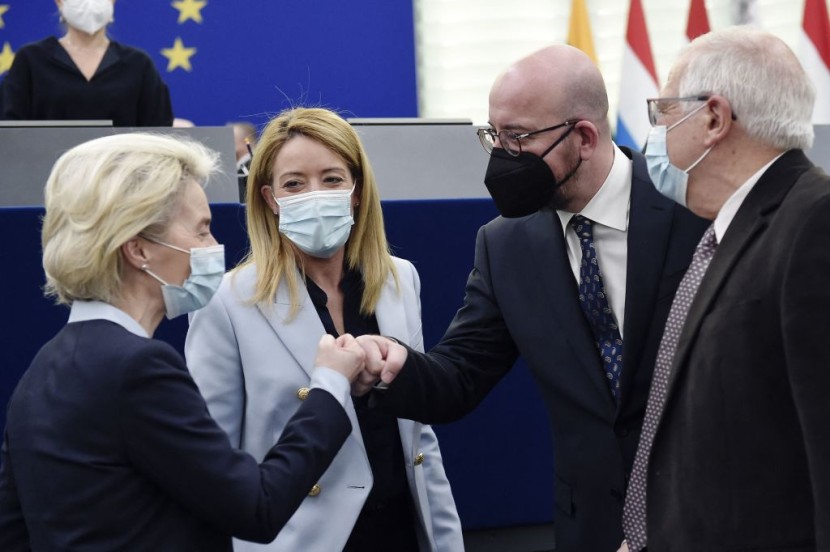
Several European countries expelled more than 73 Russian diplomats following the release of horrendous images of the alleged Russian army's mass killings of civilians in Ukraine.
Greece has announced on Wednesday its removal of 12 members of the diplomatic and consular missions of the Russian Federation.
According to the Greek Foreign Ministry, the Russian diplomats were declared "as personae non-gratae," and the Russian Ambassador in the country was informed about the decision, CNN reported.
On Tuesday, Portugal, Italy, Sweden, Spain, Estonia, Denmark, and Latvia all declared that Russian diplomats and personnel would be expelled from their respective countries.
Spain's foreign minister, Jose Manuel Albares, announced that his country was removing roughly 25 Russian diplomats and embassy workers who pose "a threat" to the country's "interests and security."
Security Threat
Italy's Foreign Minister, Luigi Di Maio, announced in a statement early on Tuesday that his government had ordered the expulsion of 30 Russian envoys for national security reasons, according to The Guardian.
The Italian official explained that the decision is "in agreement with other European and Atlantic partners," which is "necessary" in connection to national security. He added that the measure is "in the context of the current crisis caused by the unjustified aggression against Ukraine on the part of the Russian Federation."
Sweden has also declared the expulsion of three Russian diplomats due to spying per Foreign Minister Ann Linde.
Meanwhile, Denmark Foreign Minister Jeppe Kofod said that the country has expelled 15 Russian "intelligence officers" disguised as diplomats who have been proven to have conducted "spying on Danish soil."
The Danish government has also expressed its condemnation of "Russia's brutality" against civilians in the Ukrainian town of Bucha" and called the attacks "a war crime."
However, Denmark clarified that it "does not wish to break diplomatic relations" with Russia. Kofod said that the Russian ambassador and the rest of the embassy in Copenhagen are not included in the "expulsion."
Russia's ambassador to Denmark was informed of the decision on Tuesday morning, where the government also expressed its denunciation of "Russia's brutality" against civilians in Bucha."
"Deliberate attacks against civilians are a war crime," it said.
On the same day, Latvia and Estonia ordered the closure of two Russian consulates and advised their staff to leave their respective countries. The personnel's number was not cited.
The Latvian Foreign Ministry said that the action was made in support of Ukraine in its battle against Russia's "unprovoked and unjustified" military strikes, according to a report from Al Jazeera.
According to the ministries' statements, the consulates in Latvian towns Daugavpils and Liepaja, as well as Tartu and Narva towns in Estonia, will be closed starting April 30.
The developments on Wednesday came following a slew of actions against Russian diplomats in Europe and the United States.
France dismissed 35 Russian diplomats on Monday, while Germany ordered the expulsion of a substantial number of Russian envoys.
Read Also : Putin's Daughters Included in EU Sanctions List Amid Plans To Ban Investment That Would Benefit Russia
Russia Blasts The Removal of Envoys
Following the pullout of Russian forces in the Kyiv region, horrific photographs of corpses lying in the streets of Bucha, northwest of Kyiv, some with their hands chained behind them, drew international criticism, and the EU is mulling extra measures.
Moscow has denied responsibility, claiming that the photographs are fabricated or that the killings occurred after Russian soldiers withdrew from the region.
On Tuesday, the Kremlin said that the decision of the European countries to remove Russian diplomats would only make communication more complicated.
Kremlin spokesperson Dmitry Peskov told a journalist that "narrowing down" means for diplomatic communication in an unprecedented crisis is a "short-sighted move that will further complicate our communication" that is necessary for resolving the war in Ukraine.
"And this will inevitably lead to retaliatory steps," he said.
Related Article: Emmanuel Macron Will Mold the European Union Into a Stronger Bloc If He Wins the Election








